Another incredible list of Afrikaans Idioms, their English equivalent and meaning, because we like them and need them so! Patience, repetition, making connections with expressions already known as well as with visual clues are key to understanding idioms, as some are easier to decode and grasp than others.
40 + Incredible Afrikaans Idioms sorted A to Z, with English equivalents and meaning.
‘n Appel en ‘n ei (Eier)
Literal translation: An apple and an egg.
Corresponding English Idiom: Dirt cheap / as cheap as chips / dime a dozen.
Meaning: Very cheap.
Appels swaai
Word for word: Swinging apples.
Corresponding English Idiom: To roll with the punches.
Meaning: Fighting with fists / fisting / boxing.
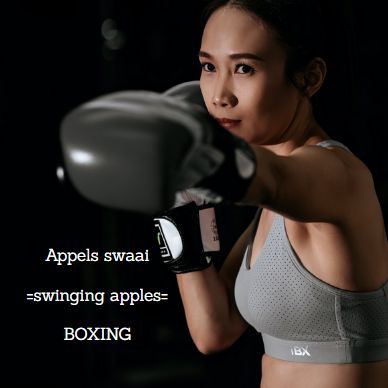
Die baba / kind met die badwater uitgooi
Verbatim: Throw the baby out/away with the bath water.
Corresponding English Idiom: To make matters worse / Add insult to injury.
Meaning: To lose the essential element by indiscriminate rejection / Mising the big picture by pointing out small mistakes / To share the good and reject the bad / To lose valuable. ideas while attempting to get rid of what is unwanted.
Balke saag
Exact translation: Sawing beams.
Corresponding English Idiom: Sawing timber.
Meaning: To saw the air / sleeping, one is snoring.
Die bul by die horings pak
Literally: Taking the bull by the horns.
Corresponding English Idiom: To take the bull by the horns.
Meaning: To take up a large task / to face a situation head on, especially a difficult or dangerous situation.
Die dam onder die eend uitruk
Literal translation: Yanking the dam from under the duck.
Corresponding English Idiom: To go overboard.
Meaning: To go overboard, to the extreme with something / To act without restraint in some area.
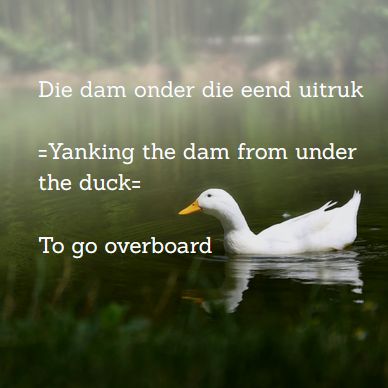
Op eiers loop
Word for word translation: To walk on eggs.
Corresponding Idiom: To walk on eggshells.
Meaning: To act very carefully as to not offend someone.
‘n Eiertjie lê
Verbally translated: To lay an egg.
Corresponding Idiom in English: Adding your two cents worth.
Meaning: To always have something to say.
Die goeie tegelyk met die slegte verwerp
Exact translation: reject the good at the same time as the bad.
Corresponding English Idiom: Take the rough with the smooth.
Meaning: To reject both the negative and positive aspects of something. The phrase is typically used in an acknowledgement that nothing is perfect.
(Kan/Sal/Gaan) nie hond haaraf maak nie
Translated word by word: (Can/Shall/Will) not take a dog’s hair off.
Corresponding English Idiom: Bite off more than you can chew.
Meaning: (Can/Shall/Will etc.) not get something right / unable to finish the task at hand.

Snuffel op die Internet rond / ‘op die net/Internet rondkuier/rondsnuffel/rondrits’.
Literally: Browse the Internet.
English Idiom: Surf the web.
Meaning:Be online / connect to the Internet.
Jakkals trou met wolf se vrou
Literally: Jackal marries wolf’s wife.
Corresponding English Idiom: The devil is beating his wife.
Meaning: The sun is shining while it’s raining (a sunshower).
Jong osse inspan
Literally: To harness young oxen.
Corresponding English Idiom: As sick as a dog / Looking green around the gills.
Meaning: Vomiting.
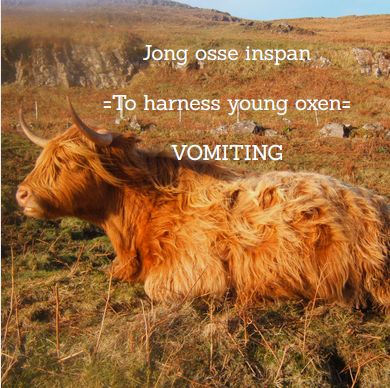
Aan jouself begin twyfel
Literal translation: To begin to doubt yourself / your abilities.
Corresponding English Idiom: Keep your eye on the prize.
Meaning: remain focused on a particular goal or award, especially when the path to it is long or arduous.
Katte skiet
Literally: Shooting cats.
Corresponding English Idiom: As sick as a dog / Looking green around the gills.
Meaning: Vomiting.
In die kollig
Word for word: In the limelight / spotlight.
Corresponding English Idiom: Be in the spotlight / under the spotlight.
Meaning: To be in the center of attention.
READ: How to use 24 Afrikaans Idioms in Sentences, with Lekker Examples
Koppe bymekaar sit
Literal translation: Putting heads together.
English Idiom: Put your heads together.
Meaning: To work together to come up with an idea or solution.
Sy lot is beslis
Translation: His fate is certain / sealed.
English Idiom: Time puts everything in its place / His fate is sealed.
Meaning: To have the knowledge that an unpleasant thing will happen to someone.
Al is jy nie op jou mond geval nie
Word for word translation: Even if you did not fall on your mouth.
Corresponding English Idiom: Be a know-it-all.
Meaning: Never be at a loss for words, have a fluent / ready / smooth tongue (or a tongue in one’s head), be lippy’ / always have an answer for everything.
Ek meneer en jy meneer, wie sal die wa smeer / As almal baas wil wees, wie sal dan Klaas wees?
Word for word translation: Me, sir, and you, sir, who will lubricate the wagon / If everyone wants to be the in charge, who will be Klaas? (see below).
Corresponding English Idiom: If two ride on a horse, one must ride behind / I stout and thou stout, who shall bear the ashes?
Meaning: When two people do something together, if both want to be in charge, there will be nobody to do the work. In Afrikaans, definition where Klaas is the ‘subordinate’.
“The translation “master and servant” reflects the typical understanding of the idiom “baas en Klaas.” “Klaas” independently is simply a forename (hence its capitalization) and not the Afrikaans word for either “servant” or “slave”— it acquires this meaning by virtue of its use in combination with “baas,” or in a context in which a class relationship of subordination is being invoked.” (Danelle van Zyl-Hermann, for Cambridge Core).
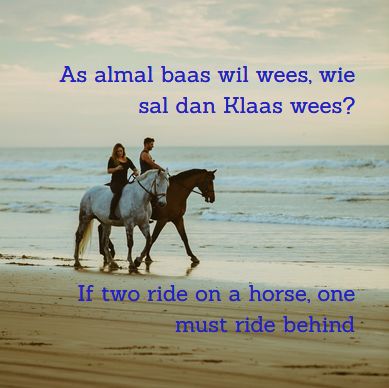
Met die hele mandtjie patats vorendag kom
Literally: Coming to the front with the whole basket of sweet potatoes.
English Corresponding Idiom: To spill the beans / To let the cat out of the bag.
Meaning: Giving all the details about something (normally in a bad sense).
Met ‘n ander man se kalwers ploeg
Literally: Plowing with another man’s calves.
English Corresponding Idiom: Plowing with someone else’s oxen / Steal the thunder.
Meaning: To use someone else’s e.g. idea / Take credit for someone else’s work.
Nat agter die ore
Literally: Wet behind the ears.
English Idiom: Wet behind the ears.
Meaning: To be inexperienced, immature or poor skilled.

Ek is nie onder ‘n kalkoen uitgebroei nie
Literal interpretation: I didn’t grew up under a turkey.
English Idiom: Born yesterday.
Meaning: Not as dumb, naive or inexperienced as you think.
Ou koeie uit die sloot uitgrawe
Literally: Digging old cows out of the ditch.
Corresponding Idiom: Digging up bones / Turning over rocks.
Meaning: Reviving an old quarrel / searching for something hard to find.
Pêrels voor die swyne werp/gooi
Literally: Throwing pearls before the swine.
Corresponding Idiom: To cast pearls before the swine.
Meaning: To impart wisdom or knowledge to someone who won’t appreciate it / to waste your time offering something that is helpful or valuable to someone who does not appreciate or understand it.
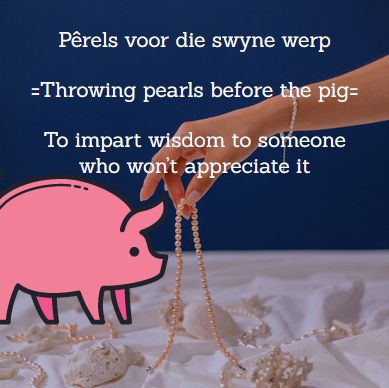
‘n Perd van ‘n ander kleur
Literally: A horse of a different color.
Corresponding Idiom: A different kettle of fish.
Meaning: A person that is different from others / a subject that is totally different from what has been discussed until then.
Die room afskep
Literally: Skim off / scoop up the cream.
Corresponding English Idiom: To strike while the iron is hot.
Meaning: To get the best out of a situation / to take advantage of a situation.
Skape tel
Literally: To count sheep.
Corresponding Idiom: Counting sheep.
Meaning: To try to go to sleep by imagining lots of white sheep jumping over a fence one by one and trying to count them.
So skaars soos hoender tande
Literally: As rare as chicken teeth.
English Idiom: Once in a blue moon.
Meaning: Something occurring very rarely.
Gaan stap vir stap te werk
Word for word translation: Work step by step.
English Idiom: One step at a time.
Meaning: slowly and carefully, doing just a little at a time, step by step.
Swartgallige uitkyk
Word for word translation: Melancholic outlook.
English Idiom: Expecting to raining on your parade / A half-empty kind of guy / Bursting his bubble.
Meaning: Having a negative or pessimistic approach, or outlook in life.

Twak verkoop
Literally: Selling tobacco / rubbish.
English Idiom: To beat one’s gums / To talk one’s ear off.
Meaning: Talking nonsense.
Te veel hooi op die vurk laai
Literally: Loading too much hay on the pitchfork.
Corresponding Idiom: To bite off more than one can chew.
Meaning: Undertaking more than one can handle.
Die verkeerde perd opsaal
Literally: To saddle the wrong horse.
Corresponding English Idiom: Barking up the wrong tree.
Meaning: Looking in the wrong place for something / Using the wrong way to get. something right / waste one’s efforts by pursuing the wrong thing or path.
Om wolf skaapwagter te maak
Literally: To make wolf shepherd.
English Idiom: A wolf in sheep’s clothing.
Meaning: To give an untrustworthy person the responsibility / A villain with an innocent appearance / a hypocritical person / someone who outwardly looks harmless and kind with good intentions but inwardly is full of hate, evil and deceit.
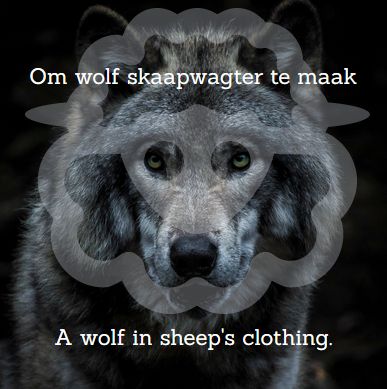
Vergewe en vergeet
Word for word translation: Forgive and forget.
English Idiom: Kiss and make up.
Meaning: To become friendly again after an argument.
Soos mis voor die son verdwyn
Literally: The fog disappears before the sun.
English Idiom: Gone into thin air.
Meaning: Disappeared without trace .
Op die vingers tik
Word for word translation: Tap on the fingers.
English Idiom: Slap on the wrist.
Meaning: To show disapproval .
Deur die wingerd loop met die wingerdgriep
Literally: Walking through the vineyard with the vineyard flu.
English Idiom: Drunk as a skunk / Three sheets in the wind.
Meaning: Being tipsy or drunk.
Om in die wolke te wees
Word for word translation: To be in the clouds.
English Idiom: To be on cloud nine / Over the moon / In seventh heaven.
Meaning: be delighted, excited, very happy.
Wrange vrugte pluk
Literally: Picking rotten fruit.
English Idiom: The chickens come home to roost.
Meaning: Having unexpected, bad consequences from your past actions.
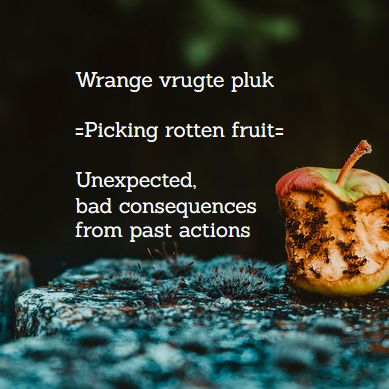
Wys waar Dawid die wortels begrawe het
Literally Translation: Show where David buried the carrots.
Corresponding English Idiom: Showing the ropes.
Meaning: To show / teach someone how a job is done.
Why are idioms so important?
The comprehension of figurative language, such as idioms and similes, expands one’s understating of a language, language use, and semantics. And this, in turn, affords the speaker access to a more dynamic use of one’s vocabulary.
Idioms, an Acrostic Poem
Intruding my peace one word at a time,
©Patricia Furstenberg
Defenseless am I in front of such speech:
Idioms, expressions, phrases with grime.
Obey elusive King Speech, what an itch!
Maybe I ought to forget my old spine –
Surely a slug needn’t know such tall speech?
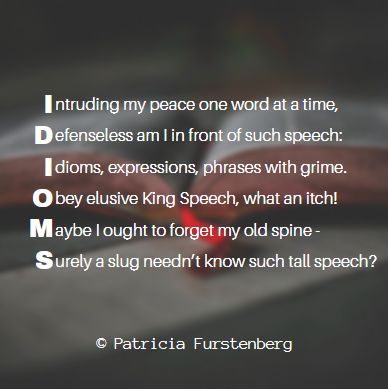

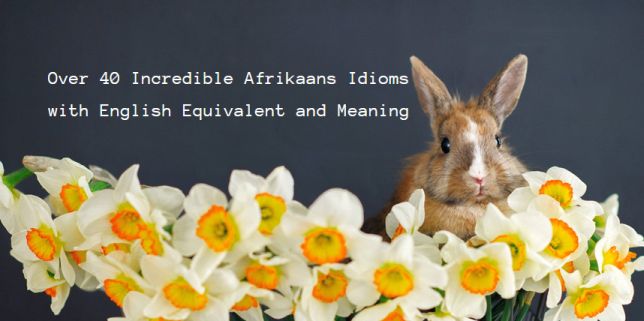
I’ve browsed the idioms, noticing here and there, the similarities between Afrikaans and German, in words like eier, perd, werk, wolke. But the real treat was at the end. I really liked the Idioms’ Poem. I’m impressed. Bravo!
Thank you so very much, Jo. Yes, lots of similarities, well spotted. Although the pronunciation is slightly different, with more accent on the vowels in Afrikaans.
This was one blog post that had to be posted. The previous one, ‘32 Original Afrikaans Idioms‘ ,tops my blog’s popularity chart since its publication.
Ah, that acrostic was fun to write 🙂 Thank you for spotting it!
Very interesting information! I never would have seen a correlation between cats, oxen, and vomiting!
Thank you, Dawn. Yes, me neither! 🙂 Languages are surprising, still!
These are fascinating!
Thank you, Susan! 🙂
WOW! Lots to chew on here Patricia! Reminding me of all the ones I haven’t used in so long was possibly going to forget them; at least one of them I wanted to!!! I definitely don’t want to try or end up looking Green around the Gills! Not fun for sure!
That only happened to me once years ago when I got too smashed at a wedding, but, it happened because I’m such a light drinker and the open bar Tender was playing me; he knew me and was snatching my drink away before I’d finish it, and refilling it with lots of potent booze; Pearl Harbors! I was crawling out the door and slept in my car for hours to wait for a friend; then safely got home!
Indeed, researching this was a good reminder for me too that languages are fascinating.
Thank you for sharing your story. That bartender should not have taken advantage like that. Best wishes.
Interesting post! Now that you mentioned it, the “Ek meneer en jy meneer, wie sal die wa smeer” idiom reminds me of the concept of “playing second fiddle.”
While the position is not exactly glamorous, it’s still necessary for an orchestra to be complete!
Thank you for following The Monching’s Guide, by the way. 🙂
My pleasure, and thank you so much for following back 🙂
Indeed so, what an orchestra be? 🙂 And great analogy. Competition isn’t always healthy.
These are brilliant! Thank you for sharing them.
Some of the literally translations are quite funny and a bit misleading (like Jakkals trou met wolf se vrou), so I’m glad you’ve put the corresponding English idiom and meaning. I love them!
Caz xx
Ah, I am glad they made you smile. 🙂
Thanks for the lesson Pat!
A rather loooong one 😉
My pleasure, Cindy. Thank you!
So interesting how meanings cannot be taken literally!
Brightens one’s day, isn’t it 🙂
Thank you for stopping by, Vanya.
The beauty of idioms.
They mean nothing close to what they look.
A great list that made me smile many times.
Great work, Patricia. 🙂
This was fun, Terveen, and a great workout for the brain 😉
Glad they made you smile!
Thanks for this nice list. Another idiom is “so arm soos ‘n kerkmuis” which is the same as English “as poor as a church mouse.” It’d be interesting to trace the roots of these idioms, my feeling is that it’s a one-way borrowing from English into Afrikaans for most of them, due to the dominance of the former, but I may be wrong.
Ah, I am glad you found it interesting.
I do have “so arm soos ‘n kerkmuis” in Afrikaanse Vergelykings 🙂
I believe you are right, it will be like going down the rabbit whole.
Thank you. I’ve got some answer already from one of your other posts, which I read since then: As there are idioms that are common to several European languages since the remotest antiquity, then in the case of those at least (such as to hit the nail on the head/slaan die spyker op die kop), it may not be a modern borrowing from English as I surmised but rather an influence from the mother tongue i.e. Dutch. I’m not proficient in Dutch enough to confirm as far as the quoted idiom is concerned but if the idiom is common to English, German and Romanian one will find something close in Dutch too, I believe. As far as “As die kat weg is, is die muis baas” is concerned, it also exists in French. These old idioms seem quite widespread so the modern borrowing hypothesis (from English into Afrikaans) may be shaky. I was probably influenced by the state of French language in Quebec; on the one hand they are very adamant in maintaining French, on the other hand one sometimes hear things like “Il a crossé la road,” Frenglish mumbo-jumbo…
Both English and Dutch are Indo-European languages, but I think that Dutch developed after English, although they did influenced one another over the centuries, as many European languages did.
To my knowledge, with Normans invading England in the 11th century, French, derived from Latin (like Romanian), influenced the Old English.
So perhaps we have to thank old Rome too for these idioms… 🙂
Ok. My line of research is more on the influence of English on Afrikaans in South Africa, that is, in modern times, the question there being: can the more local of the two languages thrive on its own without being completely changed by absorbing loads of the other, more international and dominant language? I thought an idiom like “so arm soos ‘n kerkmuis” may be a mere absorption or transcript from English “poor as a church mouse” but your posts have changed this view (as to this and/or other idioms) somewhat. Thanks again.
Modern times mean adaptation and change, for sure.
There are 11 official languages in South Africa today, with English being the most widely spoken by the younger generation.
Schools here require two languages for the final Matric certificate, 1st and 2nd additional language. The Department of Basic Education tries to offer the option of study in most of the 11 official languages – where possible. But these are early days.
Only 23% of South Africans identify English and Afrikaans as their Home Languages.
I know from the years of my children’s education in English and Afrikaans (they had an option for a 3rd language, and choose French and German) that the Afrikaans was taught as close to its linguistic roots as possible, and I mean that no English colloquialism was permitted, hence my Afrikaans Idioms and Verkleining articles – although the modern literature and cinematography includes them.
So perhaps a place to search, for you, is there, at the modern Afrikaans literature and cinematography, and see how Afrikaans has changed.
Hope this help 🙂
Best wishes,
Pat